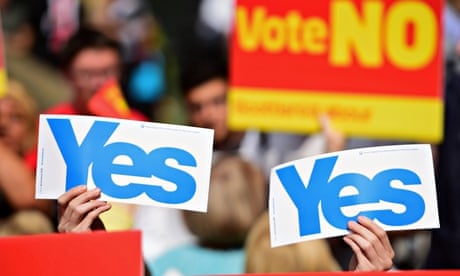What happens if Scotland votes yes next week?
Scotland would not become independent overnight. The Scottish Independence Referendum Act 2013 merely makes arrangement for the referendum to be held. As an act of the Scottish parliament, it cannot change the status of Scotland within the United Kingdom.
But surely the referendum is more than an opinion poll?
Indeed it is. It was established as part of an agreement between David Cameron and Alex Salmond, signed in October 2012 and made on behalf of their respective governments.
The Edinburgh agreement was designed to produce a "decisive and fair outcome". It ends: "The two governments are committed to continue to work together constructively in the light of the outcome, whatever it is, in the best interests of the people of Scotland and of the rest of the United Kingdom."
So the present government would be under a political obligation to deliver independence to Scotland in the event of a yes vote?
That's not what it says. Would a narrow majority be regarded as "decisive"? Would independence be "in the best interests of the people of … the rest of the United Kingdom?
Would it even be in the best interests of Scotland? Westminster might think not.
Surely Cameron could not get away with that?
He could stall. Nobody suggests that independence could be delivered before the general election in May next year. Salmond's target date is March 2016. Prof Robert Hazell, of the constitution unit at University College London, says a more realistic target would be the autumn of 2017.
Could the election not be delayed?
Legislation would be needed to amend the Fixed-term Parliaments Act 2011. It seems unrealistic to suppose that the election could be delayed for the two or three years that might be needed. The coalition might not even survive until next summer, especially if David Cameron were to resign.
Would a new government be bound by the Edinburgh agreement?
Incoming governments normally regard themselves as bound by the international obligations of their predecessors. The Labour party has made it clear that it would follow this convention. But it would be even easier for Labour to argue about the detail of the Edinburgh agreement than the present government.
Even if there is a decisive majority for independence next week?
Yes. By then we shall have a much clearer idea of whether independence is in the best interests of the people of Scotland and of the rest of the United Kingdom. We shall know whether opponents of independence were right about the damage to the economy, both in Scotland and the rest of the UK. We shall know whether greater devolution – devo max – has met Scotland's legitimate concerns.
So could an incoming government continue to stall?
It would be accused of going back on the Edinburgh agreement. But parliament would not be bound to approve the necessary legislation. An incoming government – whatever its political composition – might not be able to secure a majority for the breakup of the union, however hard the whips worked. And Labour, with its strong Scottish support, would lose the prospect of forming another government – perhaps for a generation.
But that won't satisfy Salmond
Time for another referendum, then.

Comments (…)
Sign in or create your Guardian account to join the discussion